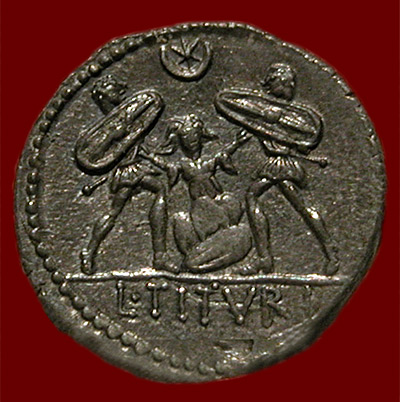 Tarpeia crushed by Sabine shields (Roman denarius, 89 BCE)
Tarpeia crushed by Sabine shields (Roman denarius, 89 BCE)
Tarpeia is more myth than woman, belonging to Rome's lengendary period. The aetiological story associated with her explains the name of the cliff on Rome's Capitoline Hill from which murderers and traitors were hurled to their deaths. Although Tarpeia is said to be the daughter of Spurius Tarquinius, the Roman commander of the citadel which protected access into Rome, she images Roman fears about their vulnerability through women, seen as "the other." After Romulus's clever hosting of games during which his citizens abducted brides from the neighboring Sabines who attended, the Sabine king Titus Tatius led their families in an attack on Rome, to avenge the insult and restore their honor. There are varying accounts of what happened and why, signaling Roman uneasiness with female treachery. Was she a priestess of Vesta, driven by desire for the handsome Tatius (see Propertius Elegiae 4.4)? a greedy traitor corrupted by the massive gold bracelets the Sabine soldiers wore? a naive heroine who tried to get the invaders to hand over their shields? Livy favors the mali exemplum, treating Tarpeia's actions as a warning to men and her punishment as a warning to women. It is no accident that Livy frames the story of Tarpeia with the account of the Sabine women, thus juxtaposing the female ideal and its antithesis. The Sabine women, foreigners who become Romans by force, show loyalty to both kin and husband, reconciling and uniting their families under the agency of Concordia. Tarpeia instead enters Roman lore as the woman whose greed fails father, gods, and country. For more about Tarpeia, see Welsh (2012, 2015) and Garani in the Bibliography.